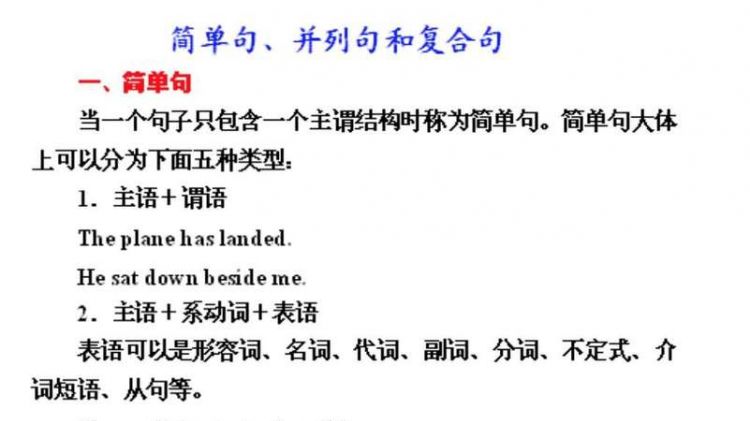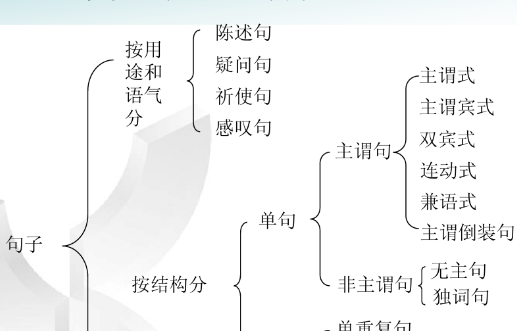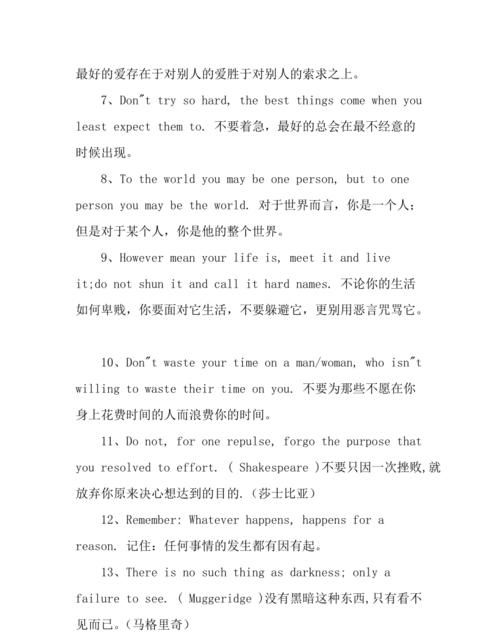本文目录
英语复合句例句及翻译
一、简单句
1. The man cooks. 男人做饭。
2.The sun is shining brightly. 太阳在明亮地照耀着。
3.We all breathe, eat, and drink. 我们呼吸、吃和喝。
二、复合句
1.What he wants to tell us is not clear. 他要跟我们说什么,还不清楚。
2.Whether there is life on the moon is an interesting question. 月球上有没有生命是个有趣的问题。
3.We 碃定百剐知溉版税保粳don’t think you are here. 我们认为你不在这。
关于英语的一些句式
1.句子的基本结构是:主谓宾(或许还有 补语、定语、状语、表语)要学会找句子主干。
2.从句子结构上分,可以将句子分为简单句、复合句和并列句。
3.简单句:有一套主谓宾的句子。如:It will not happen again.
4.复合句:包括主、从句两个部分。句子的某一个成分,主、宾、定、状或表语,是由一个句子充当的。
5.主语从句:如果主语是有句子充当的,就是主语从句。如:That I am late for school will not happen again. 宾语从句 如:Mr. Wang knew that I was late again.
6.定语从句: I was late for school, which is known to all.
7.状语从句:I was late for school again because John stopped me on my way to school.
8.并列句:就是句子有2套或者2套以上的主谓宾。 A句 and/but B 句 的形式。
I am from China, and he is from the U.S。

英语并列复合复杂句例句30个
英语写作的复合句句型例句
1、It is quite obvious that they need more help in English.
2、It is good news that she is sti.

3、It was hard to understand why Prof. Hardy had singled out Mary for criticism.
1、Nothing could hide the fact that he is growing old.
2、The fact that he works hard does not necessarily mean that he is a competent leader.
3、I have a complacent feeling that I m highly intelligent.
4、The explanation that he didn t see the notice is unsatisfactory./ The explanation is unsatisfactory that he didn t see the notice.
5、Most of us don t agree with his view that there is no advantage in introducing the new method.
6、The news soon spread throughout the country that he won the first gold medal at the 23rd Olympic Games.
7、His suggestion that intelligence is a relative matter is not universally accepted./His suggestion is not universally accepted that intelligence is a relative matter.
8、He seconded my motion that the vote be postponed.
9、The fear that he might not be able to finish the work disturbed him greatly./ The fear disturbed him greatly that he might not be able to finish the work.
10、We expressed a hope that Mr. and Mrs. Morrison would come and visit China again.
英语句型结构知识点“复合句”详解
复合句
复合句(Complex Sentence)由一个主句(Principal Clause)和一个或一个以上的从句(Subordinate Clause)构成。
主句是全句的主体,通常可以独立存在;从句则是一个句子成分,不能独立存在。
从句不能单独成句,但它也有主语部分和谓语部分,就像一个句子一样。所不同在于,从句须由一个关联词(connective)引导。
宾语从句的语法意义及结构
语法意义:宾语从句在复合句中作主句的宾语。宾语从句通常由连词(that, whether, if)、连接代词(which, what, who, whose, whom)或连接副词(where, how, when, why)等引导。及物动词、介词或某些系表结构后可带宾语从句。
句型结构:主语+谓语+引导词+主语+谓语(+其他成分)
结果状语从句
连词有:so … that, such … that
(1) so...that"如此……以致",that在非正式文体中可以省略,so后面接形容词或副词。如:
She spoke __________ fast ___________ nobody could catch what she was saying.
她说话如此之快竟没有人听出来她在讲什么。
There is _________ little time left _________ I have to tell you about it later.
现在剩下的时间不多了,我只好以后再给你讲这件事。
(2) such...that"如此……以致",
具体内 容是:①such +形容词+名词+that从句。其中的名词可以是可数名词的单数或复数,也可以是不可数名词。
② such +a/an+形容词+单数名词+that从句,可换成so+形容词+a/an+单数名词+that从句。如:
The Japanese student made _________ rapid progress __________ he soon began to write article in Chinese.
英语中的复合句有哪些类型
1、并列复句:也、又、还、同时、另外、既……又……、不是……而是……、一方面……一方面……
2、递进复句:甚至、并且、而且、更、况且、何况、反而、不仅……而且……等。
3、选择复句:或者……或者……、是……还是……、宁可、要么……要么……、不是……就是……等。
4、转折复句:但、但是、反倒、却、可、可是、然而、只是、不过、虽然……但是……等。
5、因果复句:由于、因此、因而、所以、以致、因为、可见、既然、因为……所以……、既然……就等。
6、条件复句:就、便、只要、只有……才……、除非……才……、只要……就……、无论……都……等。
7、假设复句:那么、便、要不然、否则、如果……那么……、要是……就……、即使……也……等。

扩展资料
复合句分为并列复合句compound sentence(也称并列句)和主从或从属复合句complex sentence(也称复杂句)。
并列复合句compound sentence为有并列连词:and、or、but连接;从属复合句complex sentence由一个主句(Principal Clause)和一个或一个以上的从句(Subordinate Clause)构成。用疑问词作引导词,主句是全句的主体,通常可以独立存在。
从句则是一个句子成分,不能独立存在。从句不能单独成句,但它也有主语部分和谓语部分,就像一个句子一样。所不同在于,从句须由一个关联词(conjunction)引导。 根据引导从句功能不同,大致可分为:主语从句、表语从句、宾语从句、定语从句、状语从句等。
英语中复句是什么意思
英语的复合句一般分为三大类型:名词性从句、形容词性从句和副词性从句。
(一) 名词性从句
在整个复合句中起名词作用,充当主语、宾语、表语和同位语等的各种从句,统称为名词性从句。名词性从句主要有以下几种:
1. that 引导的从句 e.g. It is reported that one third of Guangzhou citizens plan to buy a private car. (据报道,三分之一的广州市民打算购买私家车。)
2. whether/if 引导的从句 e.g. Whether motorcycles should be banned in Guangzhou has become an issue of controversy.(广州是否禁摩托车成了有争议的话题。)
3. how/why/when/where引导的从句 e.g. This essay aims to explore why so many white collar workers suffer from insomnia. (本文将探讨为什么这么多白领失眠的原因。)
4. who/whom/whose/what/which引导的从句 e.g. Who should be responsible for the environmental degradation is still unknown.(谁对环境恶化负责还不清楚。)
(二) 形容词性从句
具有形容词功能,在复合句中做定语的从句被称之为形容词性从句或定语从句。被修饰的名词、词组或代词被称为先行词。形容词性从句分为两种类型:
(1)由关系代词 who, whom, whose, that, which, as引导的从句。 例如: People who are strongly against human cloning claim that it is immoral and unethical. (强烈反对克隆人的人们认为这样做不道德和不合伦理)
(2)由关系副词when, where, why引导的从句。例如: I would like to analyze the reasons why a growing number of teenagers are addicted to gambling.(我将分析为什么越来越多的青少年沉迷于赌博的原因。)
(三) 副词性从句
副词性从句也称为状语从句,主要用来修饰主句或者主句的谓语。大致分为九大类,分别表示时间、地点、原因、目的、结果、条件、让步、比较和方式。
(1)时间状语从句 e.g. When everyone is fully aware of the severity of fresh water scarcity and takes effective measures, I am convinced that we will tackle this problem constructively.(当每个人充分意识到淡水短缺的严重性,并采取有效措施,我相信我们一定能妥善解决好这个问题。)
(2) 地点状语从句 e.g. Where there is smoke, there is fire.(无风不起浪)
(3) 原因状语从句 e.g. Pets should be forbidden because they may spread diseases and damage the cityscape.(应该禁止饲养宠物,因为它们可能会传播疾病和有损市容。)
(4) 目的状语从句 e.g. Old people should be encouraged to live in a nursing house so that they can enjoy professional care and first-rate facilities. (应当鼓励老人到敬老院居住,这样他们可以享受到专业的照料和一流的设施。)
(5) 结果状语从句 e.g. Some government officials fail to recognize the potential hazards of improper waste disposal, so that the environment in some cities is deteriorating.(一些政府官员未能认识到垃圾处理不当带来的潜在危害,因此一些城市的环境不断恶化。)
(6) 条件状语从句 e.g. If we continue to overlook the increasing waste in Guangzhou, it is likely that Guangzhou will become a huge landfill site sooner or later.(如果我们继续无视广州日益增多的垃圾,有可能不久的将来广州将成为巨大的垃圾填埋场。)
(7)让步状语从句 e.g. While I admit that smoking has some side-effects, I still feel that it is ridiculous to ban smoking in public places.(虽然我承认吸烟有副作用,我依然觉得公共场所禁烟是荒唐的。)
(8) 比较状语从句 e.g. Red is two times as much as Blue.(红色是蓝色的两倍。)
(9) 方式状语从句 e.g. Just as we protect less able human beings, so we should safeguard the welfare of other weaker species.(正如我们保护弱者一样,我们也应该保护弱势物种的福利。)
(责任编辑:胡静平)

以上就是关于英语复合句摘抄,英语复合句例句及翻译的全部内容,以及英语复合句摘抄 的相关内容,希望能够帮到您。
